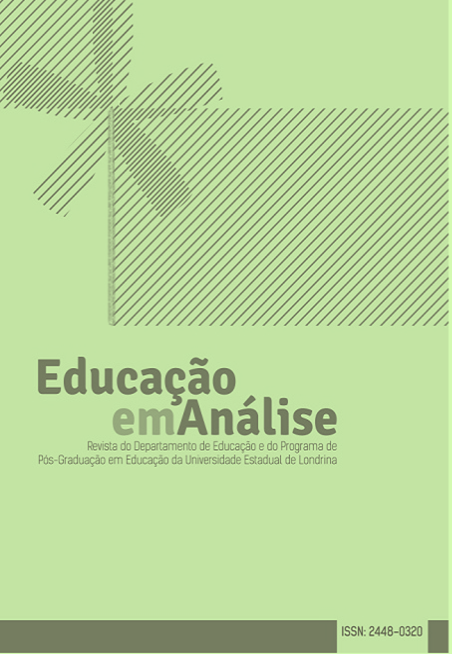Cripping queer politics, or the dangers of neoliberalism
DOI:
https://doi.org/10.5433/1984-7939.2021v6n1p105Keywords:
Activism, Deficiency, LGBTQI , Neoliberalism, Queer politicsAbstract
In this seminal text, Robert McRuer points to the neoliberal traps that are present in certain forms of activism based on identities. McRuer, based on theoretical and analytical tools circumscribed between queer and crip theory, discusses how it is necessary to observe the material contexts in which certain identities are positively at the expense of others.
Downloads
References
CHASIN, A. Selling out: the lesbian and gay movement goes to market. New York: Palgrave, 2001.
DOLHINOW, R. A jumble of needs: women’s activism and neoliberalism in the colonias of the southwest. Minneapolis: University of Minnesota Press, 2010.
DUMÉNIL, G.; LÉVY, D. The neoliberal (counter-) revolution. In. SAAD-FILHO, A.; JOHNSTON, D. (ed.). Neoliberalism: a critical reader. London: Pluto, p. 09-19, 2005.
DUGGAN, L. The twilight of equality? neoliberalism, cultural politics, and the attack on democracy. Boston: Beacon Press, 2003.
DUGGAN, L. After neoliberalism? from crisis to organizing for queer economic justice. The Scholar & Feminist Online, New York, v. 10, p. 1-2, 2012.
FERGUSON, R. A. Aberrations in black: toward a queer of color critique. Minneapolis: U of Minnesota Press, 2004.
FRASER, N. Justice interruptus: critical reflections on the “postsocialist” condition. New York: Routledge, 1997.
GAVÉRIO, M. A. Medo de um planeta aleijado? notas para possíveis aleijamentos da sexualidade. Áskesis, São Carlos, v. 4, p. 103-117, 2015.
HARDT, M.; NEGRI, A. Empire. Cambridge: Harvard UP, 2000.
HARDT, M.; NEGRI, A. Multitude: war and democracy in the age of empire. New York: Penguin, 2004.
LINTON, S. My body politic: a memoir. Ann Arbor: University of Michigan Press, 2007.
LOPES, D. Terceiro manifesto camp. In: LOPES, D. O homem que amava rapazes e outros ensaios. Rio de Janeiro: Aeroplano, p. 95-100, 2002.
MCRUER, R. Crip theory: cultural signs of queerness and disability. New York: New York University Press, 2006.
MCRUER, R. Taking It to the bank: independence and inclusion on the world market. Journal of Literary Disability. Liverpool, v.1, n. 2, 2007.
MELLO, A. G. Dos pontos de vista antropológico, queer e crip: corpo, gênero e sexualidade na experiência da deficiência. In: GROSSI, M.; FERNANDES, F. (org.). A força da “situação” de campo: ensaios sobre antropologia e teoria queer. Florianópolis: EdUFSC, 2018.
MELLO, A. G.; GAVERIO, M. A. Facts of cripness to the Brazilian: dialogues with Avatar, the film/Fatos da aleijadice à brasileira: diálogos com Avatar, o filme. Anuário Antropológico, Brasília, v. 44, n. 1, p. 43-65, 2019.
NOW KENYAN gays seek recognition. Daily Nation, Nairobi, 22 jan. 2007.
SNYDER, S. L.; MITCHELL, D. T. Cultural locations of disability. Chicago: University of Chicago Press, 2006.
SONTAG, Susan. Notes on “Camp”. In: Camp: Queer Aesthetics and the Performing Subject: A Reader. Edinburgh University Press, p. 53-65, 1999.
WORLD BANK. Social analysis and disability: a guidance note. incorporating disabilityinclusive development into bank-supported projects. Washington: World Bank, 2007.
Downloads
Published
How to Cite
Issue
Section
License
Os artigos publicados na Revista Educação em Análise estão sob a Licença Creative Commons Atribuição 4.0 Internacional, garantindo Acesso Aberto. Deste modo, os autores mantêm os direitos autorais de seus trabalhos e, em caso de republicação, solicita-se que indiquem a primeira publicação nesta revista. Essa licença permite que qualquer pessoa leia, baixe, copie e compartilhe o conteúdo, desde que a devida citação seja feita. Além disso, autoriza a redistribuição, adaptação e criação de obras derivadas em qualquer formato ou meio, incluindo uso comercial, desde que a atribuição à revista seja mantida.
A revista se reserva o direito de efetuar, nos originais, alterações de ordem normativa, ortográfica e gramatical, com vistas a manter o padrão culto da língua e a credibilidade do veículo. Respeitará, no entanto, o estilo de escrever dos autores. Alterações, correções ou sugestões de ordem conceitual serão encaminhadas aos autores, quando necessário.
As opiniões emitidas pelos autores dos artigos são de sua exclusiva responsabilidade.









